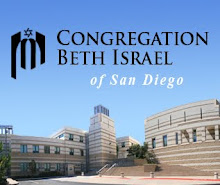I've been thinking a lot lately about what the term "Jewish Music" means. Is it only liturgical pieces, or in a Jewish languague like Hebrew? Does Jewish music convey a certain mood? Does it simply have to be written or performed by Jews? Is Bob Dylan singing "Here Comes Santa Claus" Jewish? I think Jewish music has elements of all of these questions. To paraphrase Potter Stewart, I know it when I hear it. And this brings me to my favorite piece of Jewish music, Shir Hamaalos" sung by one of the most famous cantors of all time, Yosef (Yossele) Rosenblatt. Most people assume the tune was written by him beacuse it is so associated with him, but it was actually written by a cantor named Pinchas Minkowsky. The text is Psalm 126, one of the "Songs of Ascent" that was sung as the pilgrims to the Temple in Jerusalem climbed the steps onto the Mount. It is a song of longing and hope, and you can feel this is Rosenblatt's redition. You want to stand tall and cry at the same time. Maybe that is why it was considered in the short list to be Israel's national anthem. "Hatikvah," of course, won out, but I think this tune would have been a great choice. It is a great piece of Jewish music because I think it encapsulates much of Jewish thought and history. It has a biblical text that is used liturgically. It is about exile and yearning for the Promised Land. The music is a great mix of Western and Eastern, and the tune was written by a Jew (which one cannot definately claim with "Hatikvah"). You would probably like to hear it by now. I don't know what is up with the video. Just listen to the music.
If this doesn't move you . . . I guess you can disagree with me, but this does it to me everytime. For all those "Hatikvah" fans, here is my favorite version. Some complain that "Hatikvah" is too Ashkenazi, but here is a great Mizrahi version. Enjoy.
Tuesday, December 1, 2009
Subscribe to:
Post Comments (Atom)






No comments:
Post a Comment